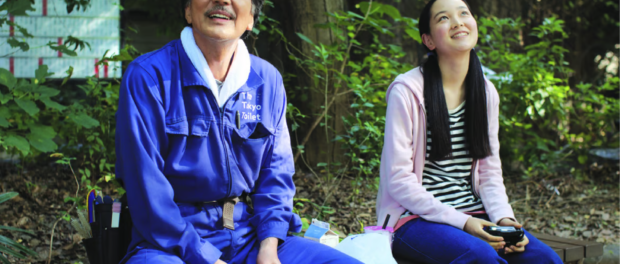Review: Perfect Days
Sometimes a film comes at exactly the right moment in your life.
Wim Wenders’ Perfect Days follows a string of exceptional days in the life of Hirayama (Koji Yakusho), a Tokyo public toilet cleaner whose day to day life is a fugue of repetitious actions. Hirayama wakes up to the sound of an old woman sweeping the sidewalk and bird song. He jumps from bed, folds up his mattress and blanket, brushes his teeth, cares for his collection of tree seedlings, slips into his jumpsuit, and heads off for a day of silently scrubbing public toilets around Tokyo. Even his one day off a week is on repeat: doing laundry, purchasing a used book, and a meal at the Izakaya.
Despite the fact his existence seems monotonous and lonely, it certainly isn’t empty. With a stereotypical Japanese zeal for work and politeness, Hirayama invests his full attention in all that he does, carefully inspecting his handiwork with a mirror to make sure the toilets are spotless. He interrupts his work to let those who need the toilets use them. Like the living embodiment of a Zen koan, he enjoys finds moments of beauty in his simple routine, whether that is choosing a different song for his commute or admiring the trees.
But then life interrupts, or rather, people do — his co-worker needs to borrow his car, his niece turns up after running away from home — and while Hirayama tries to to handle the disruptions with grace, he is soon put at the limit of what his emotional capabilities. This comes across not through dialogue, but in subtle action and facial expressions. Wenders captures Hirayama’s inner turmoil with characteristic poetic understatement. The experiences of the characters are relatable and yet the audience only has a few pieces of the puzzle to understand their motivations. Some scenes tease with what came before or offer possible afters. The viewer must suggest their own narrative to Hirayama’s life or, for those who prefer to dissect every metaphor, do a film-school-style analysis on the people, places, and objects for the message Wenders intends to convey.
For my own part, Hirayama’s situation and his laconic interactions left me thinking long afterwards on the context that led this gentle, emotional, yet restrained man to this particular life. Does the mundanity of the work represent something noble to Hirayama — certainly the Japanese have great affection for their toilets and there are CEOs in Japan’s top companies that begin their day cleaning a toilet. He certainly treats each bathroom with the same diligence and affection he has for the seedlings he’s collected from shrines. Yet, his talkative co-worker serves as a foil to remind us that scrubbing toilets is also a mindless, low-paying job, something beneath Hirayama’s intellectual abilities. It’s especially through a brief conversation with his sister that Hirayama’s highly regulated bachelor life in a tiny apartment with a weekly drink at an Izakaya point to his break from normalcy or even a mental illness. Whatever the reason, Hirayama has ended up in a life of less than his abilities, but in doing so, he gives himself space and freedom to help those in need and enjoy simple pleasures. Although, Wenders and co-writer Takuma Takasaki do not seem to suggest that this monkish, low-footprint life is ideal for anyone. We also see the cost of Hirayama’s choice, if indeed it is a choice — the loneliness that accompanies a lack of true connection, his repressed desire for affection, and his limited capacity to endure frustrations. The implication is that a “perfect” life is one full of messy, challenging interactions with others that push a man outside of his limits of comfort and the familiar. A state of uncomfortable yet comfortable survival is a mere shadow compared to the more fully realized existence of a bigger, more connected life.
Lately, I’ve spent a lot of time thinking about the cultural phenomenon of disenfranchised and marginalized men, and how it has manifested around the world such as the Chinese concept of lying down, quiet quitting, men who have have resigned themselves to spending their days watching YouTube videos or trolling the easily offended on Reddit. What is the point of having ambitions or trying to improve one’s life when the cost to do so is beyond their means and abilities? How can we call ourselves a good society if meaningful human connection and purpose is only available to those with money, power, and/or a win in the genetic lottery? Or is this just a well-circulated misconception that many make true by their belief in its validity? I found myself in tears throughout the film, deeply touched by this solitary man’s life and hoping he would find a greater existence by sacrificing his serenity in order to benefit from the imperfections of others.
Perfect Days is playing at Cinéma du Parc.






